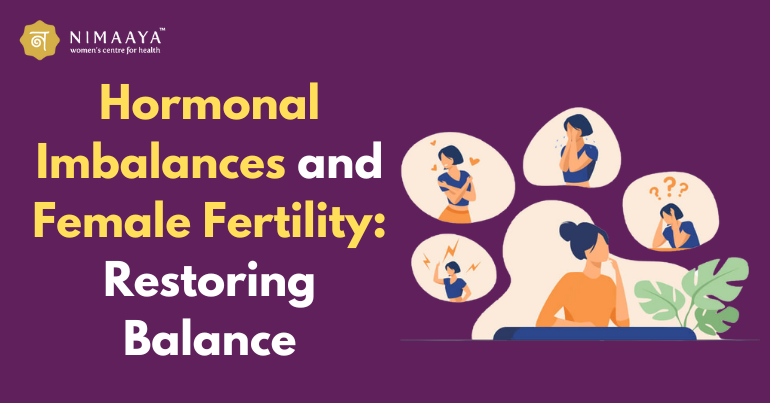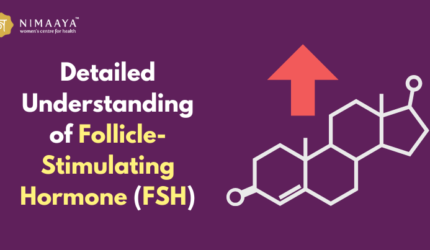Introduction
In the intricate dance of the female reproductive system, hormones play a starring role. However, when these hormones fall out of step, it can lead to a myriad of issues, particularly concerning fertility. Hormonal imbalances can wreak havoc on a woman’s ability to conceive, but with the right knowledge and treatment, balance can be restored. Let’s delve into the depths of imbalances in hormones, exploring their meaning, hormonal imbalance symptoms, causes, and most importantly, the avenues for treatment. If you’re navigating the labyrinth of imbalances in hormones and seeking solutions, you’ve come to the right place.
Understanding Hormonal Imbalances
Now we will know the hormonal imbalances meaning in detail. Hormones act as messengers in the body, regulating various functions from metabolism to mood, and crucially, fertility. When these chemical messengers are disrupted, it can lead to imbalances in hormones. This imbalance can stem from a multitude of factors, including stress, diet, lifestyle, and underlying medical conditions.
Decoding Hormonal Imbalance Symptoms
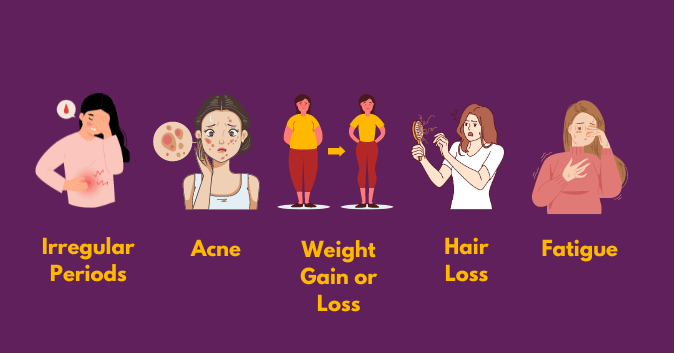
Recognizing the signs of hormonal imbalances is the first step towards regaining control over one’s reproductive health. Common hormonal imbalance symptoms include irregular periods, acne, weight gain or loss, hair loss, fatigue, mood swings, and decreased libido. It’s essential for women experiencing these symptoms to consult with a healthcare professional for accurate diagnosis and tailored treatment plans.
❧ Irregular Periods:
Irregular menstrual cycles, characterized by variations in cycle length or skipped periods, are hallmark signs of imbalances in hormones. Fluctuations in estrogen and progesterone levels can disrupt the delicate rhythm of the menstrual cycle, leading to irregularity. Tracking menstrual patterns can provide valuable insights into hormonal health and guide treatment decisions.
❧ Acne:
Hormonal fluctuations, particularly elevated levels of androgens like testosterone, can stimulate excess oil production in the skin, contributing to acne flare-ups. Adult-onset acne, especially along the jawline and chin, may indicate imbalances in hormones. Addressing underlying hormonal issues is essential for managing acne effectively and promoting clear, healthy skin.
❧ Weight Gain or Loss:
Imbalances in hormones can influence metabolism and appetite regulation, resulting in unexplained weight changes. Insulin resistance, thyroid dysfunction, or imbalances in leptin and ghrelin hormones may contribute to weight gain or difficulty losing weight. A comprehensive approach that addresses imbalances in hormones alongside dietary modifications and exercise can support sustainable weight management.
❧ Hair Loss:
Changes in hormone levels, particularly fluctuations in androgens like dihydrotestosterone (DHT), can disrupt the hair growth cycle, leading to thinning hair or hair loss. Conditions such as female pattern hair loss or telogen effluvium may be indicative of imbalances in hormones. Seeking timely intervention can help identify the underlying cause and implement targeted treatments to promote hair growth and scalp health.
❧ Fatigue:
Imbalances in hormones, particularly disruptions in thyroid hormones or adrenal function, can contribute to feelings of fatigue and low energy levels. Chronic stress, inadequate sleep, and adrenal fatigue may exacerbate hormonal imbalances, perpetuating a cycle of fatigue. Addressing lifestyle factors and implementing strategies to support adrenal and thyroid health can help alleviate fatigue and restore vitality.
❧ Mood Swings:
Fluctuations in estrogen, progesterone, and serotonin levels can influence neurotransmitter activity in the brain, contributing to mood swings and emotional instability. Women may experience heightened irritability, anxiety, or depression during certain phases of their menstrual cycle or as a result of imbalances in hormones. Incorporating stress management techniques, mindfulness practices, and hormonal support can help stabilize mood and emotional well-being.
❧ Decreased Libido:
Imbalances in hormones, such as low testosterone levels or estrogen dominance, can dampen sexual desire and libido in women. Changes in hormone levels, along with factors like stress, fatigue, and relationship dynamics, can impact sexual function and satisfaction. Addressing underlying imbalances in hormones and fostering open communication with partners are essential steps in reclaiming sexual vitality and intimacy.
Recognizing these telltale hormonal imbalance signs empowers women to take proactive steps toward restoring hormonal harmony and optimizing reproductive health. Treatment of hormonal disorders may involve lifestyle modifications, dietary changes, hormone replacement therapy, or other targeted interventions tailored to individual needs. Consulting with a healthcare professional experienced in hormonal health is crucial for accurate diagnosis and comprehensive treatment planning.
Also Read: Exploring the Top 5 IVF Centers in Surat
Delving into the Causes of Hormonal Imbalance
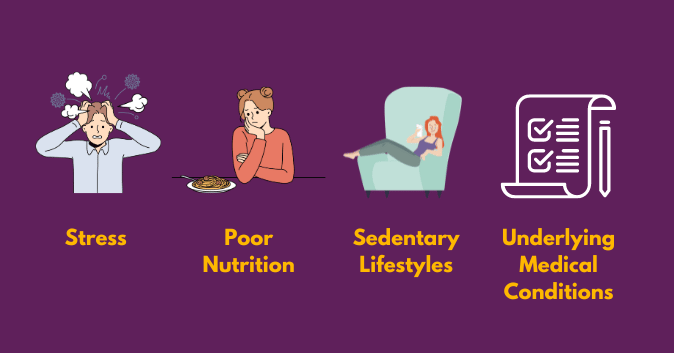
Hormonal imbalances can stem from a myriad of factors, both internal and external. Common culprits include stress, poor nutrition, sedentary lifestyles, and underlying medical conditions such as polycystic ovary syndrome (PCOS) or thyroid disorders. Environmental factors like exposure to endocrine-disrupting chemicals in everyday products can also contribute to hormonal fluctuations. Understanding the root causes empowers women to make informed choices to restore hormonal equilibrium.
Hormonal imbalances in women can arise from a multitude of factors, each exerting its influence on the delicate hormonal symphony within the body. Let’s unravel some of the primary culprits behind hormonal disruptions:
➛ Stress:
The modern-day epidemic of stress can wreak havoc on hormonal balance. Elevated levels of cortisol, the stress hormone, can disrupt the production and regulation of other key hormones, leading to irregular menstrual cycles, decreased fertility, and exacerbating conditions like PCOS and thyroid disorders.
➛ Poor Nutrition:
A diet lacking in essential nutrients can impair hormone synthesis and function, exacerbating imbalances in hormones. Consuming excessively processed foods, sugar, and unhealthy fats can lead to insulin resistance, disrupting hormone levels and increasing the risk of conditions such as PCOS and estrogen dominance.
Also Read: Nutrition & Antenatal Care: A Comprehensive Guide
➛ Sedentary Lifestyles:
Physical inactivity not only impacts overall health but also affects hormonal balance. Regular exercise is crucial for regulating hormone levels, promoting insulin sensitivity, and reducing stress. Sedentary lifestyles, on the other hand, can contribute to weight gain, insulin resistance, and imbalances in hormones, particularly in conditions like PCOS.
➛ Underlying Medical Conditions:
Conditions such as polycystic ovary syndrome (PCOS) and thyroid disorders are notorious for disrupting hormonal balance in women. PCOS, characterized by imbalances in hormones and ovarian cysts, can lead to irregular periods, infertility, and hormonal acne. Thyroid disorders, including hypothyroidism and hyperthyroidism, can profoundly impact metabolism, energy levels, and reproductive health.
➛ Environmental Factors:
Exposure to endocrine-disrupting chemicals (EDCs) in everyday products can interfere with hormonal signaling pathways, contributing to imbalances in hormones. These chemicals, found in plastics, pesticides, cosmetics, and household cleaners, can mimic or block hormone action, leading to disruptions in reproductive health, menstrual irregularities, and fertility issues.
Understanding the root causes of imbalances in hormones empowers women to take proactive steps toward restoring equilibrium. By addressing lifestyle factors such as stress management, nutrition, and physical activity, women can support hormone balance and enhance overall well-being. Additionally, seeking medical evaluation and treatment for underlying conditions like PCOS or thyroid disorders is essential for effectively managing hormonal imbalances and optimizing reproductive health.
What are the 5 Hormonal Imbalances?
Hormones are the body’s chemical messengers, orchestrating a wide array of physiological processes essential for overall health and well-being. When these delicate hormonal systems fall out of balance, it can have profound effects on various aspects of health, including fertility. Here, we delve into the five primary imbalances in hormones that commonly impact female reproductive health:
① Estrogen Imbalance:

Estrogen, often dubbed the “female hormone,” plays a pivotal role in regulating the menstrual cycle, supporting reproductive function, and maintaining bone density. An imbalance in estrogen levels can lead to irregular periods, menstrual abnormalities, and even fertility issues. Too much estrogen, known as estrogen dominance, may contribute to conditions like polycystic ovary syndrome (PCOS) and endometriosis, while insufficient estrogen levels can result in amenorrhea or difficulties conceiving.
② Progesterone Deficiency:
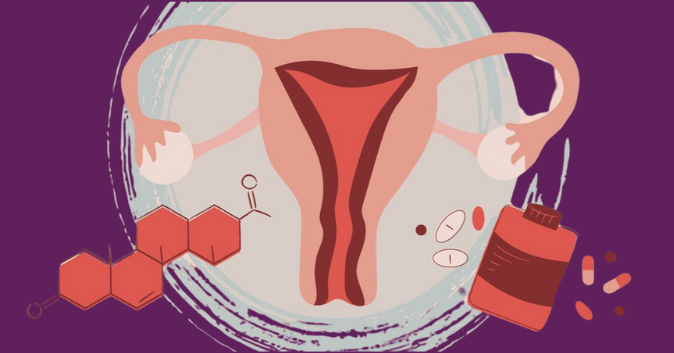
Progesterone is another key hormone involved in the menstrual cycle and pregnancy. It helps regulate the menstrual cycle, supports implantation of the fertilized egg in the uterus, and maintains pregnancy. A progesterone deficiency can disrupt the menstrual cycle, leading to irregular periods, spotting, or difficulty maintaining pregnancy. Low progesterone levels are often associated with conditions such as luteal phase defects or recurrent miscarriages.
③ Thyroid Dysfunction:
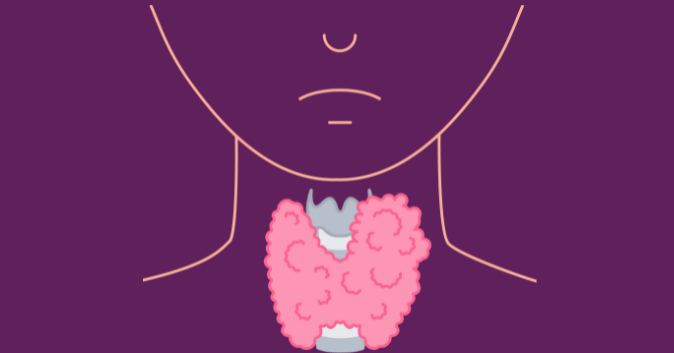
The hormones that control body temperature, energy levels, and metabolism are produced by the thyroid gland. Thyroid dysfunction, whether hypothyroidism (underactive thyroid) or hyperthyroidism (overactive thyroid), can profoundly impact reproductive health. Hypothyroidism may cause irregular periods, anovulation (lack of ovulation), or infertility, while hyperthyroidism can lead to menstrual irregularities and decreased fertility. Thyroid disorders should be promptly diagnosed and managed to optimize reproductive outcomes.
④ Androgen Excess:

While androgens are typically associated with male characteristics, women also produce small amounts of these hormones. Excessive levels of androgens, such as testosterone, can disrupt the delicate hormonal balance in women. Conditions like polycystic ovary syndrome (PCOS) are characterized by androgen excess, leading to symptoms such as irregular periods, acne, hirsutism (excessive hair growth), and infertility. Managing androgen levels is crucial for restoring hormonal equilibrium and improving fertility in women with PCOS.
⑤ Prolactin Imbalance:

Prolactin is a hormone primarily responsible for milk production during breastfeeding. However, elevated prolactin levels outside of pregnancy and lactation can interfere with normal ovarian function and fertility. Conditions like hyperprolactinemia, characterized by high levels of prolactin, can disrupt the menstrual cycle, cause ovulatory dysfunction, and impair fertility. Addressing prolactin imbalances through medication or other interventions may help restore fertility in affected women.
Imbalances in hormones can significantly impact female reproductive health and fertility. Understanding the five primary hormonal imbalances, estrogen imbalance, progesterone deficiency, thyroid dysfunction, androgen excess, and prolactin imbalance—is crucial for effective diagnosis and treatment. By addressing these imbalances through lifestyle modifications, medication, or medical interventions under the guidance of healthcare professionals, women can work towards restoring hormonal equilibrium and optimizing their fertility journey.
How to Test Hormonal Imbalances?
To accurately diagnose imbalances in hormones, healthcare providers may employ various tests tailored to assess specific hormone levels and functions within the body. A hormonal imbalance test typically involves collecting blood, saliva, or urine samples to measure hormone concentrations and evaluate their interactions. Blood tests are commonly utilized to assess levels of key hormones such as estrogen, progesterone, testosterone, thyroid hormones, and cortisol. Saliva testing may offer insights into hormone levels throughout the day, providing a more comprehensive picture of hormone fluctuations.
Additionally, urine tests can detect metabolites of certain hormones, aiding in the evaluation of hormone metabolism and excretion patterns. These diagnostic tests, conducted under the guidance of experienced healthcare professionals, enable precise identification of imbalances in hormones, guiding the development of targeted treatment strategies to restore hormonal equilibrium and promote optimal health.
Treatment for Hormonal Imbalance
When it comes to addressing imbalances in hormones, effective treatment strategies are key to restoring harmony within the body. Hormonal imbalance treatment encompasses a range of approaches tailored to individual needs, aiming to rebalance hormone levels and alleviate distressing symptoms. From lifestyle modifications such as dietary adjustments, regular exercise, and stress management techniques to medicinal solutions like hormone replacement therapy (HRT) or oral contraceptives, the options are diverse.
Consulting with a healthcare provider is essential to determine the most suitable course of action based on the underlying cause and severity of the imbalance. With proper treatment, women can reclaim control over their hormonal health and pave the way toward improved fertility and overall well-being.
Conclusion:-
In the intricate tapestry of female fertility, hormonal disorders can pose significant challenges. However, armed with knowledge, awareness, and proactive measures, women can take control of their reproductive health and embark on a journey towards hormonal harmony. By deciphering symptoms, addressing underlying hormonal imbalance causes, and exploring treatment options, restoring hormonal balance becomes an achievable goal.
Consulting the expertise of the Best Gynecologist in Surat like Nimaya IVF Center, can provide invaluable guidance and support in navigating this journey. Whether through medication, lifestyle changes, or a combination of both, the path to fertility and well-being begins with understanding and embracing the intricacies of hormonal balance.

